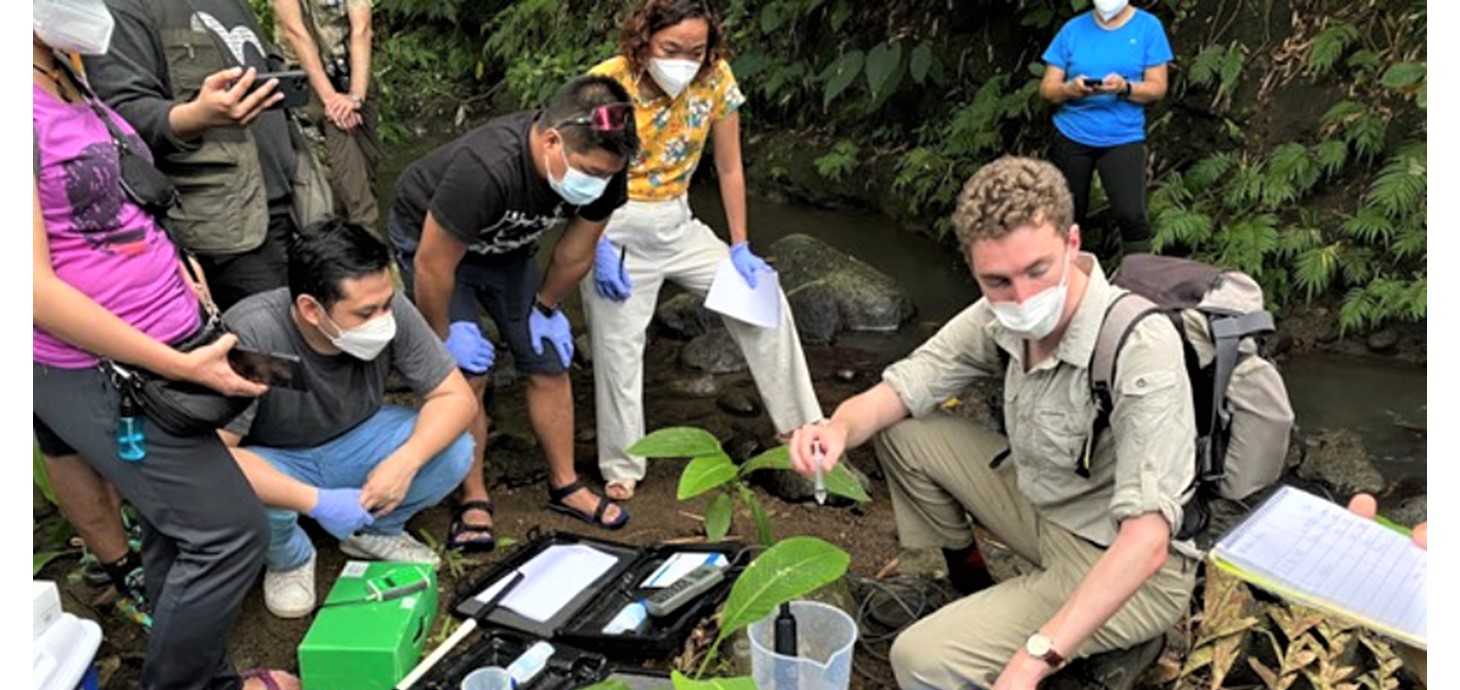
Aaron Todd (right) with Filipino colleagues. He conducted fieldwork with a team of eight researchers across two river catchments, collecting water and sediment samples
Mining metals that are crucial for net zero technologies, but in a way that does not harm the environment, is the aim of a joint UK-Philippines project which involves a Swansea University expert who has just returned from a research visit to the country.
Aaron Todd from the geography department is carrying out a PhD on river management and salt dilution flow gauging, a technique for quickly and easily estimating the flow of a small stream.
He recently took part in a research visit to the Philippines which formed part of a three-year project aimed at getting a full picture of the environmental and ecological impacts of mining on the country’s river systems.
The project is called “Pamana”, a Filipino word meaning ‘legacy’ or ‘heritage’, and it involves UK and Filipino institutions. Swansea University is not formally part of the project but Aaron has been involved alongside his external PhD supervisor Dr Patrick Byrne of Liverpool John Moores University, which is one of the institutions in the project partnership.
The Philippines is one of the most mineral rich nations in the world and is particularly wealthy in metals such as chromium, copper, nickel and cobalt, which are critical to the global net-zero transition.
These metals are key components of batteries and green technologies like solar panels, wind turbines and electric vehicles.
However, no new mining activities have occurred in the Philippines for 10 years with heightened public concern over the ecological and human health impacts of future mining activities.
The PAMANA project is developing a new national-scale framework for monitoring and quantifying the environmental and ecological impacts of mining activities in the Philippines.
The goal is to help the Philippines to develop and expand their mining activities whilst protecting environments and ecosystems through new regulatory standards and monitoring approaches.
Whilst in the country, Aaron and colleagues ran a workshop to share knowledge between the UK and Filipino researchers as well as with interested industrial partners. As part of this he led practical sessions on salt dilution flow gauging, his specialist area, which he has developed through research funded by KESS II at the Nantymwyn lead mine in Carmarthenshire.
Aaron also spent three weeks conducting fieldwork with a team of eight researchers across two river catchments. They were collecting water and sediment samples, flow gauging the rivers with a variety of techniques, including salt dilution flow gauging. They were also measuring the flow of larger rivers using a device called an acoustic Doppler current profiler (ADCP), using the world’s smallest example of this device.
Aaron Todd of Swansea University department of geography said:
“It was great to put into practise the techniques I’ve been using in Wales thousands of kilometres away in the Philippines. I learned a lot during the workshop and again during the fieldwork, and hopefully the training I gave was useful to the delegates.
I’m thankful to Dr Byrne and the excellent team at the University of the Philippines for welcoming me to the project for a month, and to the Institute of Materials, Minerals and Mining for supporting my role in this exchange of knowledge between two countries.”
Knowledge Economy Skills Scholarships (KESS 2) is a pan-Wales higher level skills initiative led by Bangor University on behalf of the higher education sector in Wales. It is part funded by the Welsh Government’s European Social Fund (ESF) convergence programme for West Wales and the Valleys.
Story credit: Liverpool John Moores University
Sustainable Futures, Energy and the Environment - Swansea research
